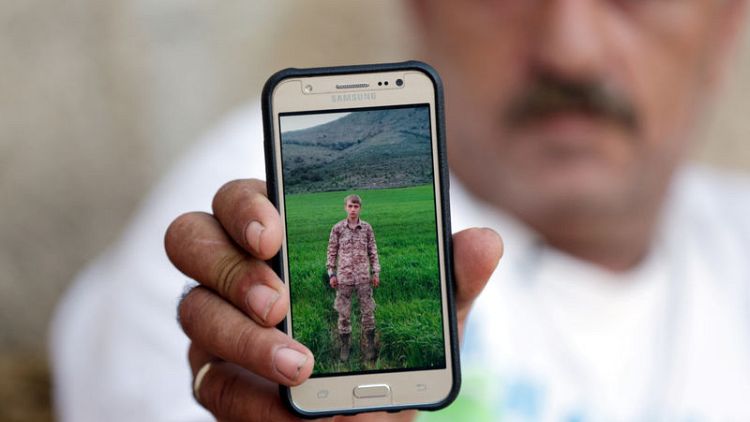By Khalil Ashawi
AL-BAB, Syria (Reuters) - Turkey is compensating the families of Syrian rebels who died fighting in support of its offensive in Syria's Afrin, promising them citizenship and a house in Turkey, a rebel commander and families said.
The move further escalates Turkey's role in the de facto buffer zone it has carved out in northwest Syria. It points to Ankara's growing entanglement as its forces spread across that arc, with long-term implications for their Syrian allies.
The Turkish military pushed into the northwest in two offensives. The first, "Euphrates Shield" in 2016, drove Islamic State from territory along the border.
The second, "Olive Branch", wrestled the nearby Afrin region from the hands of Syrian Kurdish forces this spring.
Lieutenant Abdallah Halawa, commander of the Hamza Brigade rebels, said the family of each fighter killed in Afrin was getting 60,000 Turkish Lira ($9,142.02).
Relatives of 65 men from his faction have already been compensated. They will get housing and citizenship in Turkey, he told Reuters.
"It does not compare to what they sacrificed but, to the best of our abilities, it's about honoring them."
Injured rebels will also later receive 15,000 Turkish Lira each, and may get up to 30,000 if disabled.
Turkish security sources could not immediately be reached for comment.
Turkey was long a key backer of rebels who fought President Bashar al-Assad in Syria's war. Its focus shifted in recent years to mending ties with his ally Russia and curbing the power of the Kurdish YPG militia.
U.S. support for the YPG has infuriated Turkey, which sees it as an extension of the outlawed Kurdish PKK movement that has waged a decades-long insurgency inside Turkey.
Kurdish authorities in northern Syria see Turkey as an invader. Ankara has repeatedly denied their allegations of human rights violations in its Afrin operation.
The United Nations has said after the offensive that more than 134,000 people remained displaced in harsh conditions in a cluster of towns nearby.
'DEFENDING THIS LAND'
Halawa said the Afrin battle marked the first time rebels received such compensation. "We have no supporters of the Syrian revolution left except for the Turkish brothers."
He said there could soon be similar plans for those who battled Islamic State nearly two years ago, seizing the wide strip between the towns of Azaz and Jarablus.
Syrian rebel authorities have sought to develop an administration there, as Turkey helps with reconstruction, funds schools, and trains police.
The northwest corner now remains Syria's last major rebel stronghold. Assad calls the Turkish forces illegal occupiers and has vowed to recover "every inch" of the country.
Relatives of three rebels who fought in Afrin said that after they got 60,000 Turkish Lira, officials recently called them in to a border town to submit fingerprints and documents.
"We were promised citizenship and a house on Turkish soil," said Maamoun Shaaban, whose 19-year-old son was killed. "The Turkish brothers have spared no effort to help us."
Shaaban, 51, and three other sons have all fought across the northwest as part of the Ahrar al-Sharqia faction.
He said his wife and small kids might move but he would stay in Syria if they get Turkish passports. "And if there are coming battles, we stand ready, my sons and I, even if we're all martyred for defending this land."
Malak al-Sweid, 30, said she would likely move to Turkey when she becomes a citizen.
She continues to receive her late husband's salary, around 500 Turkish Lira, from the Hamza Brigade. When he died in a landmine blast in Afrin, she worried about providing for their six-year-old son.
For Ibrahim Jenbod, who works in construction and lost his 20-year-old son, the Turkish cash was "salvation" after the family fell into debt.
"They told us the (citizenship) procedure is underway," said Jenbod, who keeps his son's military hat and boots in the living room. "It's hard going through the loss, I can't forget my boy day and night."
(Writing by Ellen Francis in Beirut; Additional reporting by Dominic Evans in Istanbul; Editing by Matthew Mpoke Bigg)
